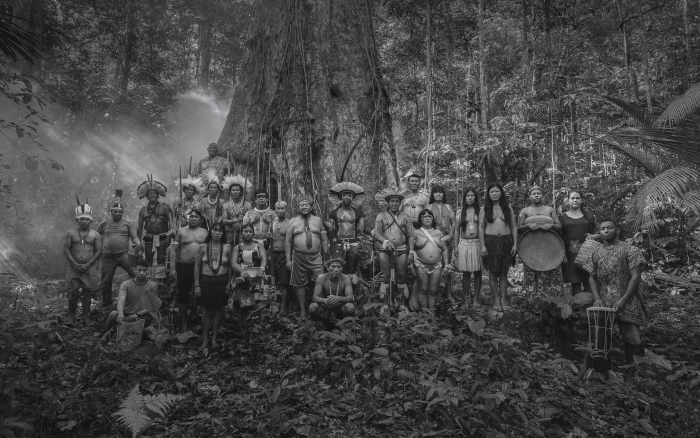Você está na versão anterior do website do ISA
Atenção
Essa é a versão antiga do site do ISA que ficou no ar até março de 2022. As informações institucionais aqui contidas podem estar desatualizadas. Acesse https://www.socioambiental.org para a versão atual.
The message from the #PeoplesOfTheForest
Thursday, 18 de April de 2019 
Who's who in the #PeoplesOfTheForest Campaign
ISA is celebrating its 25 year anniversary with the launch of the #PeoplesOfTheForest campaign to boost support for the indigenous, Quilombola, riparian and extractivist communities in Brazil who are resisting attacks on their rights and the destruction of their lands.
The peoples of the forest have a message for the Brazilian government, politicians and business community. To prospectors, loggers, squatters and other invaders of their lands: "we will continue to resist." This is one of the main messages of the #PeoplesOfTheForest campaign, which Instituto Socioambiental (ISA) and its partners in the indigenous, Quilombola, riparian and extractivist communities are launching this Tuesday, April 23, online, on TV and in cinemas. The campaign is asking for people to support the fight to protect Brazil's environmental heritage and is advocating for the rights of indigenous tribes and traditional populations.
Young people, women, medicine men, chiefs and shamans. The protagonists for the #PeoplesOfTheForest campaign are 25 leaders from nine indigenous tribes in the Amazon, from Quilombola communities in Vale do Ribeira (SP) and from riparian communities in Terra do Meio, Pará. With their strength and beauty, the campaign honors the diversity of the people living in and protecting the forests, reminding us that it is the forests that regulate the climate, produce rain for farming and house the planet's largest biodiversity, a potential source of new medications and cures.
"We, the peoples of the forest, are a global community of people and it's very important for us to join together in an alliance. This makes us stronger when it comes to confronting the 'whites' who are surrounding us," says Davi Kopenawa, a leader and great shaman of the Yanomami tribe, and one of the leading voices in the campaign. "The non-indigenous society does not know us, and this ISA campaign will bring our words to them," adds Davi Kopenawa.
Produced in partnership with the J. Walter Thompson Brasil agency and Prodigo Films, a film production company, the #PeoplesOfTheForest marks the 25th anniversary of the ISA and serves as a response from the organization and its historical partners to the setbacks, dissolutions and constitutional violations of socio-environmental policies and of the guarantees of human rights that is ongoing in Brazil. "If the forest, or nature in general, is our passport as a country to a future, then the people living in it are truly its guardians," says André Villas-Bôas, Executive Secretary at ISA. "We must value the enormous contribution these communities have made to the planet's ecological balance."
"The most remarkable and transformative thing about this film was being able to witness the exchange between indigenous tribes, Quilombolas and riparian communities." Filming created an unprecedented meeting between very important leaders. It was an honor and a privilege to be part of this project. A unique experiences," says Daniel Klajmic, stage manager for Prodigo Films. "In our current political scenario, a movie like this makes it even more important," adds the director. "The idea of the movie is to emphasize that native forest leaders have always been ready to protect and preserve their cultural legacy, which also belongs to humanity," says Ricardo John, CEO of J. Walter Thompson Brasil.
Who's who in the #PeoplesOfTheForest Campaign
Herculano Costa Silva, 52, riverbank dweller, Terra do Meio (PA)
He has battled illegal occupation of lands in Terra do Meio, Pará his entire life and fought to create the Xingu River Extractivist Reserve. He was forced to leave his land for a few years after receiving death threats. He has some cocoa crops, he collects nuts and lives off of the land, fishing and making furniture from fallen trees.
Diane Ferreira Barbosa, 39, member of the Arara people
She has two children with her husband, Herculano Costa Silva, whom they raise in the Volta da Pedra (PA) community, in the Xingu River Extractivist Reserve. She takes care of her kids, plants crops and works with other production activities, like making flour, fishing and hunting.
Herick Barbosa Silva, 19, riverbank dweller, Terra do Meio (PA)
The son of Herculano and Diane, he is a fisherman, artisan and researcher in the Xingu River Extractivist Reserve. He is getting ready to publish his first book and dreams of studying medicine and of fighting for the health of native forest populations.
Wonka Sanpia, 43, member of the Ikpeng people
He is recognized in his community for being a guardian of knowledge on traditional singing and architecture. He coordinates organization of rituals and forest expeditions to bring game to Moygu village celebrations, in the Xingu Indigenous Territory (MT).
Wanku, 40, member of the Ikpeng people
Guardian of the agricultural varietals of the Ikpeng tribe, Wanku lives in the Xingu Indigenous Territory, in Mato Grosso. She is married to Wanka Sanpla and is the mother of Oreme. She is a collector in the Xingu Seed Network, an innovative initiative joining income generation with forest restoration.
Oreme Otumaka, 26, member of the Ikpeng people
A leader among the Xingu youth, Oreme is part of the Xingu Seeds Network and is responsible for advising Network members in the upper to middle Xingu River region, in Mato Grosso.
Ianukula Kaiabi Suia, 41, member of the Kawaiwete people
With a long history of activism with the Xingu Indigenous Territory Association (ATIX), its acronym in Portuguese), he is currently the organization's president. Ianukula also worked at Brazil's National Indian Foundation (Funai) and is the son of Mairawê Kaiabi, a great leader of the Kawaiwete tribe.
Watatakalu Yawalapiti, 38, member of the Yawalapiti people
Watatakalu has been a major protagonist as a leader of Xingu women. An artisan, she holds events on indigenous art across Brazil. She is the daughter of a major leader in the Xingu Indigenous Park, the late Pirakumã Yawalapiti.
Tuiaraiup Kaiabi (Tuiat), 67, member of the Kawaiwete people
A medicine man in the Kwarujá village, he comes from a line of Xingu Indigenous Territory (MT) leaders: his father is the late Prepori Kaiabi, a leading player in defending the Kawaiwete from 1950 to 1960. His people recognize him as a guardian of agricultural diversity and he researches traditional agricultural techniques and techniques to adapt to climate change.
Eteiup Kaiabi, 33, member of the Kawaiwete people
The wife of Tuiaraiup, Eteiup lives in the Kwarujá village, in Xingu Indigenous Territory (MT). She is a farmer and a collector of seeds.
Luis Laureano da Silva, 71, member of the Baniwa people
One of the most renowned masters of Baniwa culture and one of the largest builders of malocas (traditional collective housing) in São Gabriel da Cachoeira (AM). Famous for playing japurutu flute and holding lively dabucuris (a ritual where food is offered to visitors), Luis is always invited to participate in cultural events around Brazil.
Moisés Luis da Silva, 38, member of the Baniwa people
The son of master Luiz Laureano Baniwa, he is a filmmaker and a member of the Indigenous Communicators Network of Rio Negro, a collective of 17 indigenous people, of eight ethnicities, who produce the Wayuri audio news bulletin. Moisés also wrote the Podáali documentary on Baniwa music.
Almerinda Ramos de Lima, 46, member of the Tariana people
The first and only woman to serve as president of the Federation of Indigenous Organizations of Rio Negro (Foirn), Almerinda held this position from 2013 to 2016 and currently serves as the organization's director. In 2018, she took part in the UN Climate Change Conference in Poland. She is one of the protagonists of the documentary Quentura.
Janete Figueiredo Alves, 31, member of the Desana people
A native of Iauaretê, a town in Alto Rio Negro Indigenous Territory (AM), Janete is a Coordinator of the Federation of Indigenous Organizations of Rio Negro (Foirn). Engaged in women's struggle to gain a greater voice in spaces where decisions are made, she acts to value women's work, with ceramics workshops and by supporting sales of indigenous art.
Mauro Pedrosa, 32, member of the Tukano people
Born in Alto Rio Tiquié, in Alto Rio Tiquié Indigenous Territory (AM), Mauro is currently a fellow with the Environmental and Climate Monitoring Project in São Gabriel da Cachoeira (AM). He takes part in activities and discussions on territorial and environmental management of indigenous lands in the northeast of the Amazon.
Mario Feliciano Joaquim, member of the Baniwa people
Mr. Joaquim is a master of Baniwa culture, like his brother, Luis Laureano. A resident of the Itacoatiara Mirim Community, in the peri-urban zone of São Gabriel da Cachoeira (AM), Joaquim is one of the most active people in incentivizing the celebrations held in the Maloca of Itacoatiara.
Heloísa de França Dias, 28, Quilombo, São Pedro (SP)
A São Paulo Representative with the National Coordination of Articulation of Rural Black Quilombola Communities (Conaq), Heloísa has two children and works selling Quilombola products in Vale do Ribeira (SP). She leads discussions on food security and the struggle to value the work of women in the communities.
Benedito Alves da Silva (Ditão), 64, Quilombo, Ivaporunduva (SP)
Ditão, as he is known, represents the first deeded Quilombola community in Vale do Ribeira (SP). The founder of the Articulation and Advisory Team to Black Communities in Vale do Ribeira (EAACONE) and the Movement of People Threatened by Dams (Moab), he is a great political articulator and has in-depth knowledge of the Quilombola movement.
Maria Tereza Vieira, 41, Quilombo, Nhunguara (SP)
She has three children and works with forest seed management in Vale do Ribeira, in São Paulo. She is an articulator for a network of seed collectors, an innovative initiative that began in Xingu and is now germinating among the Quilombolas of southeastern São Paulo.
Rodrigo Marinho Rodrigues da Silva, 31, Quilombo, Ivaporunduva (SP)
He works with the Articulation and Advisory Team to Black Communities (Eaacone). He also represents Quilombolas at the Forum of Traditional Tribes and Communities of Vale do Ribeira (SP/PR). He is concerned with involving youth in the fight for Quilombola territorial rights, working to articulate and shape policy regionally.
Dário Vitório Kopenawa, 36, member of the Yanomami people
The oldest child of Davi Kopenawa, Dário became a teacher in the Watorikɨ community in the 1990s, leading the bilingual intercultural education project and appreciating the written Yanomami language. He is currently the Vice President of the Yanomami Hutukara Association.
Davi Kopenawa, 63, member of the Yanomami people
A shaman, thinker and spokesperson for his people, Davi is the President of the Yanomami Hutukara Association. For 30 years, he has fought nationally and internationally to defend Yanomami territory, especially against illegal land occupation. He published the book "The Falling Sky. Words of a Yanomami Shaman," with anthropologist Bruce Albert, in Brazil in 2010, through Companhia das Letras and internationally in 2013, through Harvard University Press.
Maurício Tomé Rocha, member of the Ye'kwana people
With the Yanomami Hutukara Association for over 10 years, Maurício has gathered experience and knowledge on non-indigenous policy. He has split his time between the Fuduuwaadunnha community, in Yanomami Indigenous Territory, and the city of Boa Vista, in Roraima, since he was 13.
Maika Renato Waimiri, member of the Waimiri Atroari people
At 36 years old, Maika is the father of 5 children and a leader of the Wakyna village, in Waimiri Atroari Indigenous Territory, in Roraima.
Tuwadja Joanico Waimiri, member of the Waimiri Atroari people
At 40 years old, Joanico is the father of 12 children and a leader of the Mayamy village, in Waimiri Atroari Indigenous Territory, in Roraima.
ISA
Imagens:



